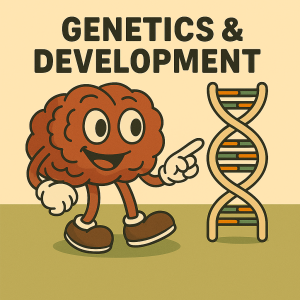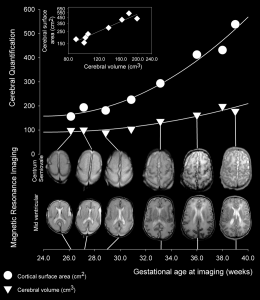Module 03: Genetics & Development

Description: This module explores how genetic mechanisms & developmental processes shape the nervous system & influence behavior. Students will examine gene expression, prenatal development, the interaction of heredity & environment, & disorders of brain development. Topics include chromosomal inheritance, mutations, neural tube formation, & the impact of early experiences on brain plasticity.

Why This Module is Important: Understanding genetics & development is essential for professionals across psychology, especially those pursuing careers in counseling, clinical practice, developmental psychology, & health psychology. This module provides insight into how biological factors—such as gene expression, prenatal development, & early life experiences—shape behavior, cognition, & emotional regulation.
For counselors, this knowledge helps:
- Recognize how genetic predispositions & developmental disruptions contribute to mental health conditions like ADHD, autism, & mood disorders.
- Understand the impact of prenatal exposures (e.g., alcohol, toxins) & early adversity on brain development & behavior.
- Navigate sensitive ethical issues, such as genetic testing, maternal responsibility, & aging interventions, with empathy & scientific grounding.
- Collaborate effectively with multidisciplinary teams in educational, clinical, & community settings to support clients across the lifespan.
For other psychology professionals, this module lays the groundwork for:
- Designing evidence-based interventions informed by developmental neuroscience.
- Conducting research on gene-environment interactions & neurodevelopmental disorders.
- Applying biological insights to improve outcomes in therapy, education, & public health.
Module Learning Objectives: By the end of this module students will be able to…
- MLO1: Identify key genetic mechanisms (e.g., gene expression, chromosomal inheritance, neural tube formation) & developmental stages that influence neural development. (CLO1, ULO3)
- MLO2: Analyze how genetic & environmental factors interact to influence brain development & behavioral outcomes, including the role of critical periods & plasticity. (CLO2, CLO3, ULO3)
- MLO3: Evaluate ethical & scientific debates surrounding genetic manipulation, maternal responsibility in fetal development, & interventions targeting biological aging. (CLO2, CLO4, ULO3)
Test Yourself: If you truly “know” this material then you will be able to…
- Summarize the stages of neural development & describe how genes regulate these processes. (MLO1)
- Compare the effects of enriched vs. deprived environments on brain development using evidence from twin & adoption studies. (MLO2)
- Critically evaluate ethical dilemmas such as fetal alcohol syndrome accountability & genetic enhancement, citing empirical research. (MLO3)
Media Attributions
- Genetic Buddy © Microsoft Copilot adapted by Jay C. Brown is licensed under a CC0 (Creative Commons Zero) license
- Woman in a Bodice and her Young Child © Mary Cassatt is licensed under a Public Domain license
- Human Cortical Development © Kapellou et al is licensed under a CC BY (Attribution) license
